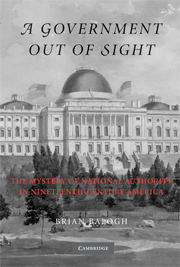Book contents
- Frontmatter
- Contents
- Acknowledgments
- 1 Introduction: Why Look Back?
- 2 How Americans Lost Sight of the State: Adapting Republican Virtue to Liberal Self-Interest
- 3 Between Revolutions: The Promise of the Developmental Vision
- 4 “To Strengthen and Perpetuate that Union”: Republican Political Economy
- 5 Outside the Boundaries: “Powers and Energies in the Extreme Parts”
- 6 The Uncontested State: Letters, Law, Localities
- 7 Restoring “Spontaneous Action and Self-Regulation”: Civil War and Civil Society
- 8 Judicial Exceptions to Gilded Age Laissez-Faire
- 9 “A Special Form of Associative Action”: New Liberalism and the National Integration of Public and Private
- 10 Conclusion: Sighting the Twentieth-Century State
- Index
1 - Introduction: Why Look Back?
Published online by Cambridge University Press: 05 August 2012
- Frontmatter
- Contents
- Acknowledgments
- 1 Introduction: Why Look Back?
- 2 How Americans Lost Sight of the State: Adapting Republican Virtue to Liberal Self-Interest
- 3 Between Revolutions: The Promise of the Developmental Vision
- 4 “To Strengthen and Perpetuate that Union”: Republican Political Economy
- 5 Outside the Boundaries: “Powers and Energies in the Extreme Parts”
- 6 The Uncontested State: Letters, Law, Localities
- 7 Restoring “Spontaneous Action and Self-Regulation”: Civil War and Civil Society
- 8 Judicial Exceptions to Gilded Age Laissez-Faire
- 9 “A Special Form of Associative Action”: New Liberalism and the National Integration of Public and Private
- 10 Conclusion: Sighting the Twentieth-Century State
- Index
Summary
Why should Americans care about their past? After all, “what have you done for me lately?” is a question posed to politicians and public officials daily, and “what will you do for me tomorrow?” is an even more common demand. Why, when “that's so twentieth century” is already an insult, should Americans care about the nineteenth century?
Here's why: the stories we absorb about the past help frame the way we see ourselves today and influence our vision of the future. Fundamental assumptions about the national government's origins and history have influenced political debate and continue to do so. For progressives, the emergence of a more powerful national government during the first decade of the twentieth century was a blessing. A remarkably resilient interpretation of American political development, originally crafted by Progressive Era activist historians like Charles Beard, traced the continued growth of national authority, powered largely by bursts of presidentially inspired reform that crested during the twentieth century through the New Deal and the Great Society. These cycles of reform were the key to building a more powerful state. Progressives applaud these developments as a marked departure from the minimalist government of the nineteenth century. Some, like Arthur Schlesinger, Jr., even predicted precisely when the next cycle of reform would begin. Others hope that charismatic leaders, like Barack Obama, will jump-start that overdue cycle.
Besides grousing about being relegated to decades without snazzy nicknames, conservatives do not dispute this interpretation of modern American politics. They do, however, question the premise that each growth spurt was beneficial for the nation. For them, morning in America shines brightest when the sun illuminates a society organized by the principles of laissez-faire.
- Type
- Chapter
- Information
- A Government Out of SightThe Mystery of National Authority in Nineteenth-Century America, pp. 1 - 17Publisher: Cambridge University PressPrint publication year: 2009



